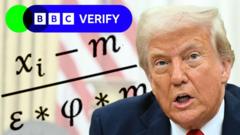Prime Minister Keir Starmer's diplomatic efforts have not shielded Britain from the latest round of tariffs imposed by President Trump. With a base rate of 10% set for the U.K., focus now shifts to future trade negotiations and potential retaliatory actions.
U.K. Faces Tariffs Amidst Trump’s Diplomatic Maneuvers

U.K. Faces Tariffs Amidst Trump’s Diplomatic Maneuvers
Despite attempts to foster goodwill, President Trump imposes tariffs on the U.K., raising questions about future trade relations.
After all the diplomatic courtesies—including a royal invitation and strategic meetings—Britain finds itself entangled in President Trump’s latest tariff imposition. Despite Prime Minister Keir Starmer’s efforts to cultivate a closer relationship with the U.S., the tariff affair rolls out with Britain being hit by a 10% tariff, while the European Union faces a steeper rate of 20%.
Starmer's advisors expressed relief that the differential treatment could save thousands of British jobs, suggesting that the softer tariff was evidence of successful diplomacy or perhaps a result of Brexit. However, this “victory” is marred by the fact that the U.K. is still subjected to blanket tariffs applied to numerous countries, despite having a trade surplus with the U.S., according to official statistics.
In light of this development, it’s clear that Britain hopes to negotiate a more favorable trade arrangement with Trump in the future. Starmer, addressing a group of business leaders, admonished them to approach the situation with “cool and calm heads.” Nonetheless, observers are wary about whether Starmer can maintain this strategy, particularly in the face of growing pressure to retaliate, similar to Canada’s actions in response to U.S. tariffs.
Downing Street has indicated that it will refrain from imposing retaliatory tariffs as long as trade negotiations are in progress. This approach has drawn mixed reviews from analysts. Jonathan Portes, a professor at King’s College London, noted that while Starmer's current strategy appears prudent, he needs to avoid confrontational tactics devoid of purpose, as well as unnecessary appeasement.
As trade tensions escalate, the fate of British exports and jobs hangs in the balance. The upcoming negotiations will be crucial in determining whether the future relationship between the U.K. and the U.S. can evolve from tariffs into mutually beneficial trade partnerships.
Starmer's advisors expressed relief that the differential treatment could save thousands of British jobs, suggesting that the softer tariff was evidence of successful diplomacy or perhaps a result of Brexit. However, this “victory” is marred by the fact that the U.K. is still subjected to blanket tariffs applied to numerous countries, despite having a trade surplus with the U.S., according to official statistics.
In light of this development, it’s clear that Britain hopes to negotiate a more favorable trade arrangement with Trump in the future. Starmer, addressing a group of business leaders, admonished them to approach the situation with “cool and calm heads.” Nonetheless, observers are wary about whether Starmer can maintain this strategy, particularly in the face of growing pressure to retaliate, similar to Canada’s actions in response to U.S. tariffs.
Downing Street has indicated that it will refrain from imposing retaliatory tariffs as long as trade negotiations are in progress. This approach has drawn mixed reviews from analysts. Jonathan Portes, a professor at King’s College London, noted that while Starmer's current strategy appears prudent, he needs to avoid confrontational tactics devoid of purpose, as well as unnecessary appeasement.
As trade tensions escalate, the fate of British exports and jobs hangs in the balance. The upcoming negotiations will be crucial in determining whether the future relationship between the U.K. and the U.S. can evolve from tariffs into mutually beneficial trade partnerships.




















